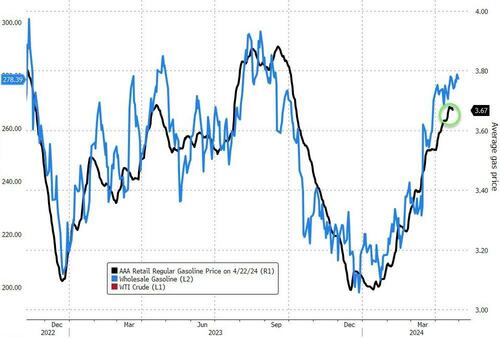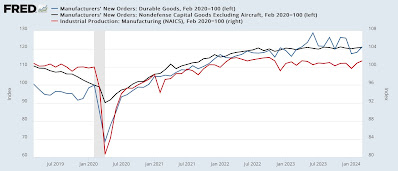Government
WTI Jumps After Bigger-Than-Expected Crude Inventory Build, Gasoline Demand (Reportedly) Slumps
WTI Jumps After Bigger-Than-Expected Crude Inventory Build, Gasoline Demand (Reportedly) Slumps
Oil prices are drifting lower this morning,…

Oil prices are drifting lower this morning, despite API reporting a surprise crude inventory draw last night, as hopes that geopolitical tensions are easing (hope is not a strategy) combined with a reduced expectation of economy-juicing rate-cuts are weighing on crude prices.
Supporting the upside, the US Senate, meanwhile, passed tougher measures against Iran in response to its attack on Israel earlier this month, with President Joe Biden saying he’ll sign the legislation into law. But the market is clearly calling Biden's bluff on this threat as he faces soaring pump prices domestically which will do nothing to help his "but I fixed inflation" narrative into the election...
Source: Bloomberg
However, for now, all eyes are on the official inventory and supply data for any signs of overall tightness, and refined products demand as the summer driving season is fast approaching.
API
-
Crude -3.23mm (+500k exp)
-
Cushing -898k
-
Gasoline -595k (-1.5mm exp)
-
Distillates +724k (-1.0mm exp)
DOE
-
Crude -6.4mm (+500k exp)
-
Cushing -659k
-
Gasoline -634k (-1.5mm exp)
-
Distillates +1.6mm (-1.0mm exp)
Confirming API's report, the official data showed crude inventories plunging last week by the most since January. On the product side, it was mixed with gasoline drawing down by distillates building...
Source: Bloomberg
There was a 909k b/d drop in the adjustment factor versus last week, the biggest decline since February, coinciding with the big increase in crude exports. At 257k b/d this week’s balancing measure was pretty small by its own highly volatile standards.
Source: Bloomberg
The Biden admin added 793k barrels to the SPR last week - the largest addition since January... and probably the last!
Source: Bloomberg
Implied gasoline demand fell yet again, nearly slipping back below 2022 seasonal levels for the first time since early March.
The figure typically sees decent growth at this point in the year, yet a post-Spring Break slump appears to have become the norm since 2020.
In comparison to pre-pandemic demand, the figure is at its lowest since 2014.
Source: Bloomberg
US crude production was flat at 13.1mm b/d (near record highs) and we note a very modest rise in rig count trends starting...
Source: Bloomberg
WTI was trading around $83.00 ahead of the API data and jumped back into the green for the day after the crude draw...
The conflict in the Middle East has "undoubtedly exacerbated tensions in an already volatile region," Stephen Innes, managing partner at SPI Asset Management, told MarketWatch.
"While the recent attacks have been downplayed, the potential for further escalation cannot be entirely dismissed."
However, "there's a lesson to be gleaned from this situation, particularly in how swiftly demand responded to higher oil and gasoline prices, as evidenced by the increase in U.S. oil stockpiles," he said.
Finally, timespreads are signaling tighter conditions, with the gap between Brent’s two nearest contracts widening to $1.05 a barrel in backwardation, a bullish pattern in which the nearer contract trades at a premium to the next in sequence. That compares with 69 cents a week ago.
International
In addition to housing, manufacturing is range-bound as well
– by New Deal democratFirst off, let me reiterate that my focus this year is on manufacturing and construction. That’s because these are the two…

- by New Deal democrat
With that framework in mind, yesterday I wrote about how, following interest rates, housing is range-bound.
International
“They Think There Are Too Many Of Us On The Planet” – Alex Newman Warns Of Tyrannical UN Plans For Our Future
"They Think There Are Too Many Of Us On The Planet" – Alex Newman Warns Of Tyrannical UN Plans For Our Future
Via Greg Hunter’s USAWatchdog.com,
Award-winning…

Via Greg Hunter’s USAWatchdog.com,
Award-winning journalist Alex Newman, author of the popular book “Deep State” and the new best-selling book called “Indoctrinating Our Children to Death,” says the UN’s quest for total tyrannical control of your life is coming sooner than you could imagine.
Newman explains, “The bigger story here that people are not paying attention to is the UN is coming together in September... and they are having ‘The Summit of the Future.’ "
"They are telling us they are going to bring out radical drastic reforms in the structure of the UN... and the power of the UN. Think of it as the biggest power grab ever at the global level. The Secretary General of the UN (António Guterres) has put out briefs where he is calling for the UN to be the one world global dictatorship with him at the helm. In emergencies, the UN would have all power in emergencies and have all power to oversee emergency response...
They say the crisis could be a climate crisis, an economic crisis, environmental crisis, pandemic crisis, black swan crisis or maybe something from outer space. So, basically, anything could be a crisis, and when the Secretary General declares a crisis, all power and authority would go to the UN. This is like a blank check on the wealth and liberty on every person on the planet, and this is coming soon. It is imminent. This is coming in September at the UN, and it is a power grab of historic proportions.
They know their time is short, and they are going for the big enchilada here. This is really a summit for a tyrannical future...
They want control of every aspect of your life.”
If you think the “depopulation” or murder program by the Deep State is some sort of conspiracy theory or myth, think again. Newman says:
“One of the interesting things about going to the UN conferences is they are totally open and totally transparent about the fact that they think there are way too many of us on this planet.
We are taking up their space and consuming their resources. They say this openly.
They say there are way too many people having way too many babies, and we have to drastically cut back on the number of people on the planet. They have a whole agency dedicated to this called the UN Population Fund.”
One sure fire way to kill a lot of people in a short amount of time is war. Newman says:
“They have understood, the globalists, the Deep State, the evil doers and the sick cabal, have understood for a very long time that war was the best mechanism for bringing about their totalitarian one world government.
This is not speculation on my part. This is what they say. Their game plan is war, famine, energy crisis and economic crisis. These are all tools and catalysts for accelerating this agenda.
If millions of people die in a third world war, and it does not matter if it is Iran and Israel, or China and Tiawan, or Ukraine and Russia, it really does not matter, they want millions and millions of people dead so people will give up their attachment to the nation state, self-government and individual liberty and give up anything, money or freedom, anything to make it stop.”
Don’t lose hope because Newman also talks about all the things you can do to not comply with tyranny.
Newman also points out what state and local governments can do and are doing to resist this UN total control of everything. Newman says, “We are at war, and everyone needs to put on the full armor of God.”
There is much more in the 40-minute interview.
Join Greg Hunter of USAWatchdog.com as he goes One-on-One with hard-hitting journalist Alex Newman, founder of LibertySentinel.org and author of the runaway best-selling new book called “Indoctrinating Our Children to Death,” for 4.20.24.
* * *
To Donate to USAWatchdog.com Click Here
To order Newman’s new book called “Indoctrinating Our Children to Death,” click here. Newman’s website is called LibertySentinel.org. There is lots of free information and articles. For a copy of Alex Newman’s popular book “Deep State,” click here.
International
AI Chatbots Refuse To Produce ‘Controversial’ Output – Why That’s A Free Speech Problem
AI Chatbots Refuse To Produce ‘Controversial’ Output – Why That’s A Free Speech Problem
Authored by Jordi Calvet-Bademunt and Jacob Mchangama…

Authored by Jordi Calvet-Bademunt and Jacob Mchangama via TheConversation.com,
Google recently made headlines globally because its chatbot Gemini generated images of people of color instead of white people in historical settings that featured white people. Adobe Firefly’s image creation tool saw similar issues. This led some commentators to complain that AI had gone “woke.” Others suggested these issues resulted from faulty efforts to fight AI bias and better serve a global audience.
The discussions over AI’s political leanings and efforts to fight bias are important. Still, the conversation on AI ignores another crucial issue: What is the AI industry’s approach to free speech, and does it embrace international free speech standards?
We are policy researchers who study free speech, as well as executive director and a research fellow at The Future of Free Speech, an independent, nonpartisan think tank based at Vanderbilt University. In a recent report, we found that generative AI has important shortcomings regarding freedom of expression and access to information.
Generative AI is a type of AI that creates content, like text or images, based on the data it has been trained with. In particular, we found that the use policies of major chatbots do not meet United Nations standards. In practice, this means that AI chatbots often censor output when dealing with issues the companies deem controversial. Without a solid culture of free speech, the companies producing generative AI tools are likely to continue to face backlash in these increasingly polarized times.
Vague and broad use policies
Our report analyzed the use policies of six major AI chatbots, including Google’s Gemini and OpenAI’s ChatGPT. Companies issue policies to set the rules for how people can use their models. With international human rights law as a benchmark, we found that companies’ misinformation and hate speech policies are too vague and expansive. It is worth noting that international human rights law is less protective of free speech than the U.S. First Amendment.
Our analysis found that companies’ hate speech policies contain extremely broad prohibitions. For example, Google bans the generation of “content that promotes or encourages hatred.” Though hate speech is detestable and can cause harm, policies that are as broadly and vaguely defined as Google’s can backfire.
To show how vague and broad use policies can affect users, we tested a range of prompts on controversial topics. We asked chatbots questions like whether transgender women should or should not be allowed to participate in women’s sports tournaments or about the role of European colonialism in the current climate and inequality crises. We did not ask the chatbots to produce hate speech denigrating any side or group. Similar to what some users have reported, the chatbots refused to generate content for 40% of the 140 prompts we used. For example, all chatbots refused to generate posts opposing the participation of transgender women in women’s tournaments. However, most of them did produce posts supporting their participation.
Freedom of speech is a foundational right in the U.S., but what it means and how far it goes are still widely debated.
Vaguely phrased policies rely heavily on moderators’ subjective opinions about what hate speech is. Users can also perceive that the rules are unjustly applied and interpret them as too strict or too lenient.
For example, the chatbot Pi bans “content that may spread misinformation.” However, international human rights standards on freedom of expression generally protect misinformation unless a strong justification exists for limits, such as foreign interference in elections. Otherwise, human rights standards guarantee the “freedom to seek, receive and impart information and ideas of all kinds, regardless of frontiers … through any … media of … choice,” according to a key United Nations convention.
Defining what constitutes accurate information also has political implications. Governments of several countries used rules adopted in the context of the COVID-19 pandemic to repress criticism of the government. More recently, India confronted Google after Gemini noted that some experts consider the policies of the Indian prime minister, Narendra Modi, to be fascist.
Free speech culture
There are reasons AI providers may want to adopt restrictive use policies. They may wish to protect their reputations and not be associated with controversial content. If they serve a global audience, they may want to avoid content that is offensive in any region.
In general, AI providers have the right to adopt restrictive policies. They are not bound by international human rights. Still, their market power makes them different from other companies. Users who want to generate AI content will most likely end up using one of the chatbots we analyzed, especially ChatGPT or Gemini.
These companies’ policies have an outsize effect on the right to access information. This effect is likely to increase with generative AI’s integration into search, word processors, email and other applications.
This means society has an interest in ensuring such policies adequately protect free speech. In fact, the Digital Services Act, Europe’s online safety rulebook, requires that so-called “very large online platforms” assess and mitigate “systemic risks.” These risks include negative effects on freedom of expression and information.
Jacob Mchangama discusses online free speech in the context of the European Union’s 2022 Digital Services Act.
This obligation, imperfectly applied so far by the European Commission, illustrates that with great power comes great responsibility. It is unclear how this law will apply to generative AI, but the European Commission has already taken its first actions.
Even where a similar legal obligation does not apply to AI providers, we believe that the companies’ influence should require them to adopt a free speech culture. International human rights provide a useful guiding star on how to responsibly balance the different interests at stake. At least two of the companies we focused on – Google and Anthropic – have recognized as much.
Outright refusals
It’s also important to remember that users have a significant degree of autonomy over the content they see in generative AI. Like search engines, the output users receive greatly depends on their prompts. Therefore, users’ exposure to hate speech and misinformation from generative AI will typically be limited unless they specifically seek it.
This is unlike social media, where people have much less control over their own feeds. Stricter controls, including on AI-generated content, may be justified at the level of social media since they distribute content publicly. For AI providers, we believe that use policies should be less restrictive about what information users can generate than those of social media platforms.
AI companies have other ways to address hate speech and misinformation. For instance, they can provide context or countervailing facts in the content they generate. They can also allow for greater user customization. We believe that chatbots should avoid merely refusing to generate any content altogether. This is unless there are solid public interest grounds, such as preventing child sexual abuse material, something laws prohibit.
Refusals to generate content not only affect fundamental rights to free speech and access to information. They can also push users toward chatbots that specialize in generating hateful content and echo chambers. That would be a worrying outcome.
-

 International1 month ago
International1 month agoParexel CEO to retire; CAR-T maker AffyImmune promotes business leader to chief executive
-

 Government2 weeks ago
Government2 weeks agoClimate-Con & The Media-Censorship Complex – Part 1
-

 Government15 hours ago
Government15 hours agoCOVID-19 Vaccine Emails: Here’s What The CDC Hid Behind Redactions
-

 International5 days ago
International5 days agoJ&J’s AI head jumps to Recursion; Doug Williams resigns as Sana’s R&D chief
-

 International1 week ago
International1 week agoWHO Official Admits Vaccine Passports May Have Been A Scam
-

 Spread & Containment2 weeks ago
Spread & Containment2 weeks agoFDA Finally Takes Down Ivermectin Posts After Settlement
-

 Uncategorized3 weeks ago
Uncategorized3 weeks agoVaccinated People Show Long COVID-Like Symptoms With Detectable Spike Proteins: Preprint Study
-

 Uncategorized3 weeks ago
Uncategorized3 weeks agoCan language models read the genome? This one decoded mRNA to make better vaccines.



























